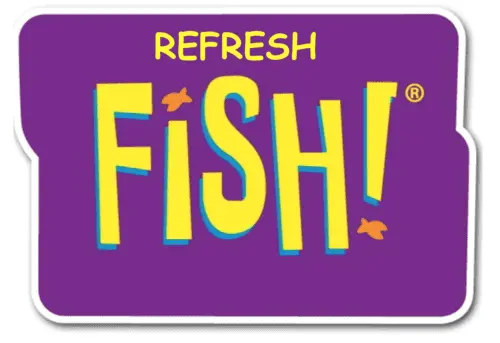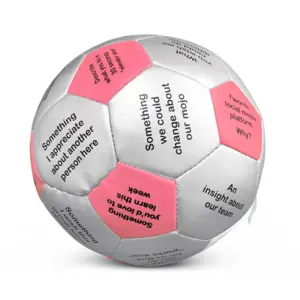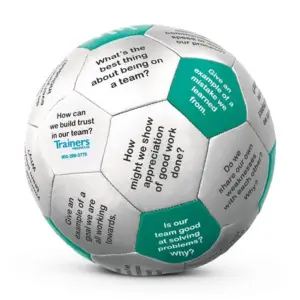Theme Day: Refresh FISH!
Theme Day: Rediscover and Refresh FISH!
Changes have to go into oblivion when not maintained. Maintenance can be done in several ways. But the safest technology is 'talking'. Just like a marriage where two people say YES to each other. After that, both parties are tasked with maintaining the relationship. They need to ask about the relationship. Investigate where the relationship can be improved and developed. They need to explore how they both keep alive the relationship, the external relations and everything else that surrounds them. This theme day is offered as an internal training day only. Price does not include transportation and accomodation.
This is exactly the case with collaboration within your company.
When collaboration is new and agreed, it requires daily maintenance.
This course is both a refresher while FISH! must be made to get stuck. So it's both FISH! and FISH! STICKS in one and the same workshop. But it's mostly about the fact that many employees have been replaced with new ones that have not been presented to FISH! and that time has passed since the first FISH! presentation. FISH! has obviously run out into the sand.
Therefore this FISH! rediscovered and refreshed.
Some have already attended a presentation. But they did not attend the presentation with their new colleagues. A lot of water has been flowing in the creek since last time. Therefore, this welcome repetition and new superstructure called FISH! STICKS.
Refresh FISH! focuses on
- Find it (everyone finds their unique approach)
- Be it (everyone finds out what it looks like), and
- Coach it (everyone gets coached and thus able to coach all the colleagues in their IT).
All prices are based on training delivery within Denmark.
Read what FISH! is here
We humans are connected to each other. Like the animals that live in communities, we humans are also connected to feel the same as those we work with. It is an evolutionary trait. When a caveman foresaw a threat and the sooner the others in the tribe became infected by this foresight, the safer they all were.
It works pretty much just like that today, except that the threats are not furry mammoths. Our stress stems from the fact that we are asked to perform more with fewer resources. Too much information. Fear of mistakes. Tensions between colleagues. Possible redundancies.
It is estimated that almost half of all employees see work as the main cause of stress in their lives. This means that either you or your colleague feels taken aback. When one feels this, the other will inevitably begin to feel the same.
There are plenty of proven strategies for reducing individual stress - meditation, regular exercise, plenty of sleep, good nutrition, giving time to recharge.
But how can we help each other? Here are a few tips to help colleagues deal with stress more effectively using FISH! philosophy.
Be there: Stand shoulder to shoulder
The human brain has evolved to be able to process incredible amounts of information. But it has trouble keeping up. We are exposed to five times as much information daily, compared to 30 years ago.
When the advanced areas of our brain that control decisions and analysis are overloaded, our primitive areas of control intervene. We switch to survival mode. It overrides our ability to reason and solve problems. We get distracted, scared and frustrated.
The logical answer should be to adapt the requirements so that the brain can keep up. Congestion will cost money in the long run through diminished focus, productivity and revenue.
However, we know that the demands will continue to increase. What is the best answer? Be there for each other. When people support and trust each other, neurochemical adjustments occur that allow the advanced brain to regain control.
If you feel stressed, do not try to deal with it alone. Your colleagues should not stand alone either. Try to create some ‘human time’ after at least two hour periods. Check and see how colleagues are doing. Encourage them to share their experiences. When sharing, listen unabashedly and attentively. The more you invest in the relationships, the more more will be there for you when you have a need.
Make their day: Help them reformulate the problem
Stress causes tunnel vision. Even the routine challenges turn into insurmountable problems. You can help colleagues regain perspective by 'reformulating' the situation.
For example, they may be unsure of how to handle their growing workload. Talk to them about what is most important. Which steps or subtasks must be performed first? Is there anything that you or another colleague can help with?
Do they doubt their own ability to do the job? Remind them that you've seen them reach their goals before. Ask for their ideas, acknowledge the best and ask questions of the less promising ideas.
Are they in conflict with a colleague? Let them tell their version and ask them to look over their emotions. What does the other colleague think? Is it about misunderstandings? Help them figure out how to talk to their colleague in a positive way.
Helping others reformulate their way of thinking is a great way to make them happy. And when you help, you also learn something.
Choose your attitude: Pay attention to your short fuse
When you are stressed, it is extremely easy to have mood swings. Shame, guilt and sarcasm. We all try it once in a while.
You can be patient, supportive and cordial 95 percent of the time. But the last 5 percent, where you completely lose your temper and patience, have a huge impact on others, especially if you are a leader. It is difficult to relax with a human being who can explode at any time.
If your mood often fluctuates, people will try to avoid you. When you are nearby, they do not perform well. This affects the whole team.
When you are tempted to break out in anger, ask yourself: How will my response affect my relationship with the people I am so dependent on? How can I handle the situation with this person if we were going out to dinner together tonight?
If you are upset with someone and need to talk to them, then focus on solving the problem. Get all the facts before you judge.
Ask yourself every day, ‘What kind of person do I want to be?’ When you fall back into what we're all about, apologize - and prove that you mean it.
Play and humor
Most babies laugh a hundred times a day. Adults laugh on average just 15 times. According to Gallup, we laugh much less on weekdays than on weekends.
Research also shows that play and humor relieve stress, turn on creativity, boost analytical skills and increase collaboration skills. Why is it so straight that we do not just have any more play and humor?
The biggest concern is that play and humor are experienced differently. It is crucial that you respect each individual in the team. Remember this FISH! play and humor recommendation: Play and humor work when you are there for others, when you make them happy and choose a caring attitude.
The message is that you can easily try to give more space to play and humor: Make more fun of yourself. Laugh at the madness of life. Also laugh at the problems you are trying so hard to solve.
Play and humor closely linked to learning. A study in the Harvard Business Review shows that spending more time learning on the job reduces stress levels. Seeing oneself grow and develop builds a resilience.
Try to reformulate your short-term stress effects into long-term opportunities to learn: 'Yes, yes, stop just knowing, I only have two hands' can for example be reformulated to' If I do C first, then A and then postpone and collect B 'er, so I'll get it all right'. It's so easy to write, but so incredibly difficult to remember in the situation. Therefore, you can seek input from colleagues for your challenges. They will be happy to help you see the new perspectives.
Have a look at all the FISH! tools you can order including the iconic film FISH! that comes in many different languages. Click here and look closer https://leaderswarehouse.com/en/fish-culture-ready-to-make-work-feel-better-39/fish-film-present-the-topic-show-the-film-try-out-the-4-practices-and-agree-your-plan-with-world-famous-fishmongers-from-pike-place-fish-this-website-contains-the-most-vital-diy-tools-for-your-internal-culture-change-p816
There is no reviews yet. Be the first to write us your opinion








